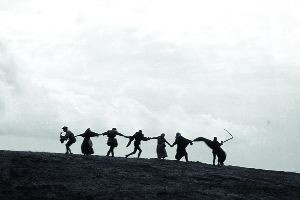Angst

I have struggled all my life with a tormented and joyless relationship with God. Faith and lack of faith, punishment, grace and rejection all were real to me, all were imperative. My prayers stank of anguish, entreaty, trust, loathing and despair. God spoke, God said nothing. Do not turn from me Thy face.
—Ingmar Bergman
Growing up in the Greek Orthodox Church, I learned to confess my sins by kneeling directly in front of the priest. I had no reason to believe that other churches handled this sacrament differently. When I first saw Ingmar Bergman’s The Seventh Seal, I was mesmerized by the scenes of Death and the Knight talking to each other, in part because they were sitting in some sort of booth with a small door between them. What a great cinematic concept, I thought. When I later visited a Catholic church for the first time and saw the rows of confessionals, my response was, “They stole the idea from Bergman!”
It was an easy conclusion to draw for someone like me, who was attending film school and just discovering, with awe, the Swedish director whose images were so potent and clear. Why wouldn’t they be adopted for use in the real world?
I also vividly remember the first time I viewed the merging faces in Persona, the old doctor’s close-up at the end of Wild Strawberries, the sister mutilating herself with a shard of glass in Cries and Whispers, and the dance of death at the end of The Seventh Seal.
Ingmar Bergman died July 30 at the age of 89. He was asleep at his home on the island of Faro, perhaps immersed in his dreams, which would often find their way into his films. The obituaries and tributes have been rolling in ever since, along with a few suggesting that Bergman wasn’t really that important or that great.
Well, he was. Though he will probably be best remembered for his art-house successes of the 1950s and 1960s, he was still on his game as late at 2003, when he wrote and directed the intense and disturbing Saraband.
Not all of his many films (he made about five dozen) were brilliant, but they were all hugely ambitious. Bergman made movies about things that matter. His aim was high and true, focusing on humankind’s search for meaning in the short gap between birth and death.
He was also, as has been well documented, an artist who drew from his myriad life experiences to fill large canvases about the choices we make, and the steep price we pay for our mistakes.
Bergman had a difficult childhood with a strict pastor father. “Most of our upbringing was based on such concepts as sin, confession, punishment, forgiveness and grace,” he once said. And he was a sickly child, with stomach problems that plagued him all his life. Is it any wonder that so many of his films deal with the anguish and confusion of childhood and adolescence, the struggle to understand things that seem to defy logic? (Think of the disturbed sister in Through a Glass Darkly, who sees God in the image of a spider web.)
He was a serious philanderer. He married five times, had numerous affairs (sometimes with his own leading ladies) and fathered nine children. This complex personal life, along with the difficult marriage of his parents, led him to create some of the most disturbing films ever made about marriage, including Scenes from a Marriage, whose screening on Swedish television led to a leap in the divorce rate.
Of course, Bergman will undoubtedly be remembered for his movies about faith. His early rejection of God was tied to his rejection of his father. Later the issue of God’s existence grew more complex, morphing into questions about the silence of God, which to Bergman was mysterious and cruel. This spiritual dilemma fueled such films as The Seventh Seal, The Virgin Spring and the trilogy of Through a Glass Darkly, The Silence and Winter Light. The latter film featured a small-town minister unable to provide any solace for his needy parishioners, including a man who commits suicide after seeing the emptiness in his pastor’s visage. After the trilogy, he abandoned his search for a deity and turned to human beings for some sort of solace.
His next theme was regret. He had addressed it much earlier in films like Wild Strawberries, about an old doctor who employs dreams, fantasies and memories to make sense of his unhappy life. Eventually the note of regret turned toward remorse, with a nasty edge, suggesting that delayed self-awareness does not offer salvation, especially not in a world where God remains silent.





